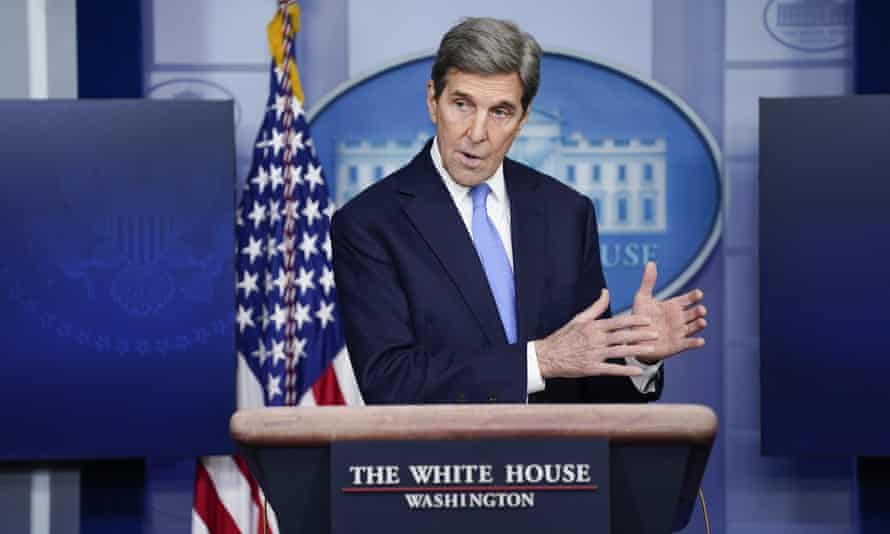Extract from The Guardian
US president hopes prime minister Scott Morrison will commit to more climate change action echoing the global push.

The US climate envoy, John Kerry, has said America and Australia have ‘differences’ on climate policy and a senior Biden administration official says Joe Biden wants Australia to commit to stronger policies.
Last modified on Thu 22 Apr 2021 12.05 AEST
The Biden administration says Australia needs to cut greenhouse gas emissions faster than planned and the US president hopes Scott Morrison will commit to doing more at a virtual summit on the climate crisis on Thursday night.
Although the Morrison government has promoted a “technology not taxes” approach to emissions reduction to convince allies that Australia is serious about making the transition, a senior Biden administration official told reporters Australia could not rely on technology alone to reach net zero emissions by 2050.
Joe Biden has promised to use the summit of 40 world leaders, which starts at 10pm eastern Australian time, to announce a short-term emissions reduction target, and called on other countries to do the same.
The United States is expected to set a goal of cutting emissions roughly in half over the next 10 years. It follows the European Union confirming a goal of a 55% cut by 2030 compared with 1990 levels, and Britain planning a 78% cut by 2035. Japan and Canada are also expected to set new targets, but Australia is not expected to increase its target of a 26-28% cut.
The Biden administration official, speaking on condition of anonymity, repeated an acknowledgment by its climate envoy, John Kerry, that the US and Australia have “differences” on climate policy.
They said it was an “open question” for Australia how it could turn what has been “a very difficult political conversation in the country” to an approach consistent with the global agenda on the climate crisis.
“I think our colleagues in Australia recognise that there’s going to have to be a shift,” the official said. “It’s insufficient to follow the existing trajectory and hope that they will be on a course to deep decarbonisation and getting to net zero emissions by mid-century.”
The official said the differences between the two countries were mostly about emissions reduction trajectory and “how do you get on it”. Where Australia’s approach was “don’t worry, technology will solve the problem”, the others believed technology would contribute but was insufficient on its own. The official described the second view as “you have to have a set of policies; you have to have national intent; you have to follow up with actions and commitments”.
“We are hopeful [Morrison] will come to the summit and make announcements around both and commit the country to next steps that we think would be critical,” the official said. “We certainly see them as a strong ally, an ally in technology development, but also an ally in the opportunities for policy development … We see enormous potential for joint work between our two countries and have a long history of cooperation.”
Australia is not expected to make any new commitments about emissions reduction targets at the summit even though there is increasing pressure on the Coalition from business and investors to adopt a net zero target by 2050 and to beef up medium-term emissions reduction targets ahead of the Cop26 conference in Glasgow in November.
Facing sustained diplomatic pressure from the US, Britain and the European Union to come to the table with significant new commitments, the Morrison government has promised $540m funding for “clean hydrogen” and carbon capture hubs and projects, and $566 to build international collaboration on developing low-emissions technology.
Analysts say Australia’s spending on technology, particularly hydrogen, is dwarfed by other countries and it is increasingly out of step in lifting commitments to meet the goals of the 2015 Paris agreement, including pursuing efforts to limit global heating to as close as 1.5C as possible.
The government has not set a zero emissions target, but the prime minister has said it would “preferably” reach it by 2050.
This week former prime ministers Kevin Rudd and Malcolm Turnbull called Australia’s 2030 emissions target “woefully inadequate” and called on Morrison to pledge at least a 45% cut.
The climate summit will be held over two days, starting with a meeting of leaders to discuss raising ambition. It will include sessions focused on investing in climate solutions, adaptation and resilience, climate security, unleashing climate innovation and the economic opportunities of acting.
China has confirmed it will attend, and the UK – host of Cop26 – signalled on Wednesday it would boost its ambition for emissions reduction. After recommendations from the government’s statutory climate advisers, Britain will cut carbon dioxide by 78% by 2035 compared with 1990 levels – an increase from the current target of a 68% reduction by 2030.
No comments:
Post a Comment